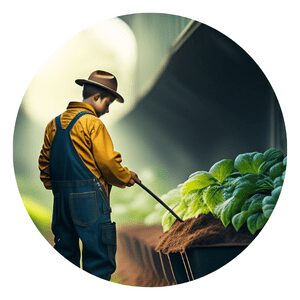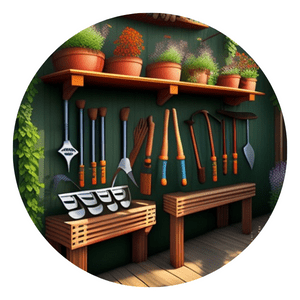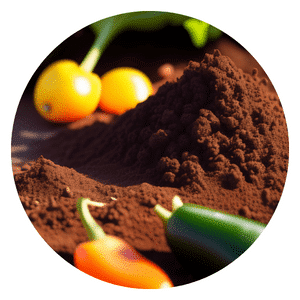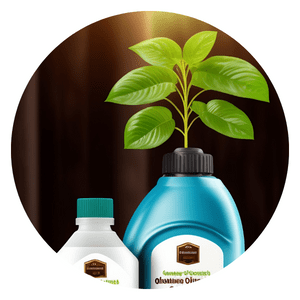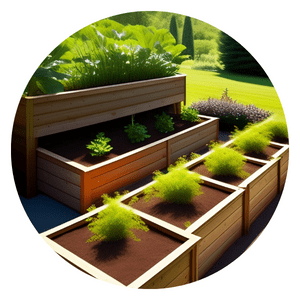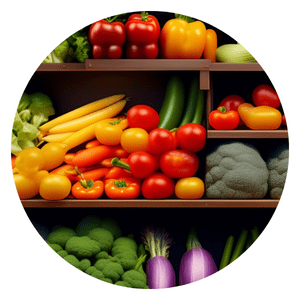Grow Organic Peppers Unique Gardening Methods
Organic gardening has gained immense popularity in recent years as people become more conscious about the origin and quality of the food they consume.
Among the plethora of organic vegetables, peppers stand out as a versatile and nutritious option.
Whether you are a seasoned gardener or just starting your green journey, this article aims to provide you with unique gardening methods, tips, and techniques to successfully grow organic peppers in your own backyard.
Peppers come in various shapes, sizes, colors, and spiciness levels, making them an attractive addition to any garden or culinary dish.
By adopting organic practices, you not only ensure that your peppers are free from harmful chemicals but also promote biodiversity and sustainability.
Pepper Gardening Methods Menu
Traditional In-Ground Gardening
Traditional in-ground gardening is a classic method for growing peppers that involves planting seeds or transplants directly into the soil of your garden beds. This method ensures that the plants receive adequate sunlight and allows for proper spacing between each pepper plant.
When planting pepper seeds, it is important to follow the recommended spacing guidelines provided on the seed packet or by your local extension office. This will ensure that each plant has enough room to grow and develop without competing for resources.
In addition to spacing, it is crucial to provide your peppers with adequate sunlight.
Most pepper varieties require at least six hours of direct sunlight per day, so choose a location in your garden that receives ample sun exposure. This will promote healthy growth and maximize fruit production.
It is also important to consider the soil conditions before planting peppers in-ground. Peppers thrive in well-draining soil with a pH level between 6.0 and 7.0.
If necessary, amend the soil with organic matter such as compost or aged manure to improve its fertility and drainage.
Overall, traditional in-ground gardening provides a straightforward approach to growing organic peppers.
By planting seeds or transplants directly in the soil of your garden beds with proper spacing and adequate sunlight, you can set yourself up for success in cultivating healthy and productive pepper plants.
Raised Bed Gardening
One method that has gained popularity in growing organic peppers is raised bed gardening.
By creating raised beds, you can ensure that your pepper plants have access to nutrient-rich soil while also improving drainage and aeration.
Raised beds are typically constructed by building up the soil in a contained area, such as with wooden boards or stones, to form a raised platform. This allows for better control over the quality of the soil used, as you can mix in compost and other organic matter to create an optimal growing environment for your peppers.
The use of raised beds in pepper gardening offers several benefits.
Firstly, it provides improved drainage for your plants by preventing water from pooling around their roots.
Excess moisture can lead to root rot and other diseases that may hinder the growth and productivity of your pepper plants.
Secondly, raised beds offer better aeration for the roots as they are not compacted by heavy foot traffic or machinery. This allows oxygen to reach the roots more easily, promoting healthier root development and overall plant growth.
In conclusion, choosing to grow your peppers in raised beds filled with nutrient-rich soil is an effective way to provide them with optimal conditions for growth and productivity. The improved drainage helps prevent water-related diseases, while enhanced aeration promotes healthier root development.
By adopting this unique gardening method, you can enjoy bountiful harvests of delicious organic peppers year after year.
Container Gardening
Container gardening is a great option for growing peppers, especially for those who have limited space or no access to a traditional garden.
By using large pots or containers on your patio or balcony, you can easily control the soil quality and temperature, which are crucial factors in pepper growth. This gives you the opportunity to create an optimal environment for your plants to thrive.
One advantage of container gardening is that it allows you to choose the type of soil that best suits your pepper plants.
Peppers prefer well-draining soil with a pH level between 6.0 and 7.0.
By selecting high-quality potting mix and adding organic matter such as compost, you can ensure that your peppers have the right nutrients they need to grow healthy and produce abundant fruit.
In addition, container gardening also offers better control over temperature conditions compared to traditional ground planting.
You can move the pots around your outdoor space based on weather patterns, ensuring that your peppers receive adequate sunlight while avoiding extreme heat or cold conditions that may hinder their growth. This flexibility allows you to extend the growing season by bringing the containers indoors during colder months or protecting them from scorching sun rays in summer.
Overall, growing peppers in large pots or containers through container gardening provides numerous benefits including easy control over soil quality and temperature conditions.
With proper care and attention, this method allows you to enjoy a bountiful harvest of organic peppers even in small spaces like patios and balconies.
In a garden of vibrant hues, With methods unique, I choose To grow organic peppers with care, Nurtured by earth, water, and air. No chemicals to kill their thrive, Just nature's touch to help them strive. From seedling to pepper so sweet, An eco-friendly harvest we greet.
Chappy The Gardener
Vertical Gardening
One effective way to grow organic peppers and make the most of limited garden space is by utilizing trellises or stakes.
By providing vertical support for your pepper plants, you can save valuable ground space and create a visually appealing garden feature.
Trellises can be made from various materials such as wood, metal, or even recycled materials like old ladders or pallets.
When using trellises, it’s important to ensure they are sturdy enough to support the weight of the growing pepper plants.
As the plants grow taller, gently tie them to the trellis using soft plant ties or twine. This will prevent them from getting tangled or damaged by wind.
Additionally, placing stakes strategically around each plant and tying them with string can provide additional stability.
Vertical gardening not only maximizes space but also improves air circulation around plants, reducing the risk of diseases and pests.
It also makes harvesting easier as peppers are more accessible at eye level rather than hidden under foliage.
With proper care and maintenance, your pepper plants will flourish on their supports while adding beauty and functionality to your garden.
Square Foot Gardening
Square foot gardening is a popular method for efficiently growing vegetables, including peppers, in small plots. This technique involves dividing the garden into designated square-foot areas and planting different crops in each section.
By doing so, gardeners can maximize their space and yield by avoiding overcrowding and allowing plants to grow optimally.
When it comes to growing peppers using this method, it is important to consider the spacing requirements of each variety.
Some pepper plants need more space than others, so it is crucial to allocate enough square feet for each plant accordingly.
Additionally, grouping similar plants together can help create an efficient use of space and facilitate care and maintenance tasks such as watering or fertilizing.
Another benefit of adopting square foot gardening for growing peppers is that it allows for better pest control.
By keeping the plants organized in separate sections, any potential pests or diseases are less likely to spread from plant to plant. This makes it easier to monitor and manage any issues that may arise throughout the growing season.
Overall, utilizing designated square-foot areas for different pepper varieties not only maximizes efficiency but also promotes healthier growth and higher yields in small garden plots.
Companion Planting
Companion planting is an age-old technique that involves growing specific plants together to benefit each other.
When it comes to peppers, there are several compatible companion plants that can help enhance their growth and deter pests.
One popular choice is basil, which not only adds a delicious aroma to the garden but also repels aphids and spider mites that could harm pepper plants.
Tomatoes are another great companion for peppers as they both have similar nutrient requirements and can share soil space efficiently.
Additionally, tomatoes emit a chemical known as solanine, which acts as a natural repellent against certain pests like aphids and whiteflies.
Marigolds are often recommended as companion plants for peppers due to their ability to repel nematodes, tiny worm-like organisms that can damage plant roots. These vibrant flowers release a chemical into the soil called alpha-terthienyl, which discourages nematodes from feeding on the roots of nearby pepper plants.
Furthermore, marigolds attract beneficial insects such as ladybugs and lacewings that feed on common pepper pests like aphids and thrips.
By incorporating these compatible companion plants alongside your peppers, you can create a more balanced ecosystem in your garden while promoting healthier growth for your pepper crops.
Hydroponic Gardening
When it comes to growing peppers hydroponically, the advantages are plentiful.
By eliminating the need for soil and relying on nutrient-rich water solutions, you have better control over the plant’s environment and avoid issues such as pests, diseases, and weeds commonly associated with traditional gardening.
Hydroponic systems provide an ideal setting for peppers to flourish as they can be grown year-round regardless of weather conditions.
To successfully grow peppers hydroponically, there are a few key techniques to keep in mind.
Firstly, choosing the right variety is crucial as some pepper types may be better suited for hydroponic cultivation than others.
Providing adequate lighting is also important since peppers require ample sunlight or artificial light to thrive.
Additionally, maintaining optimal pH levels and nutrient concentrations in the water solution ensures that your plants receive all the necessary elements for healthy growth.
In conclusion, growing peppers hydroponically offers numerous benefits such as increased control over environmental factors and year-round cultivation.
With proper attention to variety selection, lighting conditions, and nutrient management within your hydroponic system, you can enjoy a bountiful harvest of organic peppers that are free from common gardening challenges.
Aquaponic Gardening
Aquaponic gardening is a unique and innovative method of growing organic peppers that combines hydroponics with aquaculture.
In this integrated system, fish waste is used to provide essential nutrients for the pepper plants.
The waste produced by the fish is converted into nitrate by beneficial bacteria, which is then absorbed by the plants as a fertilizer. This symbiotic relationship between the fish and plants creates a self-sustaining ecosystem where both thrive.
One of the major advantages of aquaponic gardening for growing peppers is that it eliminates the need for synthetic fertilizers and pesticides.
As the fish waste provides all the necessary nutrients, there is no need to rely on chemical additives to promote plant growth or combat pests. This makes aquaponics an ideal choice for those looking to grow organic peppers in an environmentally friendly and sustainable manner.
Furthermore, aquaponic systems are highly efficient in terms of water usage compared to traditional soil-based cultivation methods.
Since water circulates within the closed-loop system, it can be continuously recycled and reused, resulting in minimal water wastage. This not only helps conserve water resources but also reduces the overall environmental impact associated with pepper cultivation.
Aquaponic gardening offers a unique approach to growing organic peppers by combining hydroponics with aquaculture.
By utilizing fish waste as a natural source of nutrients for pepper plants, this integrated system promotes sustainability while eliminating reliance on synthetic fertilizers and pesticides.
Tower Gardening
Tower gardening is a revolutionary approach that allows you to maximize your garden space while growing an abundance of peppers.
With limited space, traditional gardening methods often fall short in terms of efficiency and yield.
However, by utilizing vertical tower gardens, you can stack multiple tiers of plants and grow a variety of pepper plants all at once.
One of the key advantages of tower gardening for peppers is its space-saving feature. Instead of sprawling horizontally, these towers allow you to grow your pepper plants vertically, making efficient use of limited garden areas such as balconies or small backyard spaces.
By stacking multiple tiers on top of each other, you can significantly increase the number of pepper plants grown in the same area.
In addition to maximizing space, tower gardening also offers improved nutrient delivery and water efficiency.
Many tower systems incorporate hydroponic or aeroponic technology, which provides a continuous supply of nutrients directly to the roots. This controlled environment ensures that your peppers receive optimal nutrition throughout their growth cycle.
Moreover, these systems use less water compared to traditional soil-based gardening methods as they recirculate water within the system rather than allowing it to drain away.
Overall, tower gardening presents a smart solution for growing organic peppers in limited spaces by utilizing vertical towers stacked with multiple tiers.
Its ability to save space while maximizing yield makes it an ideal choice for urban gardeners or those with small outdoor areas.
Greenhouse Gardening
A greenhouse offers a fantastic solution for gardeners looking to extend their growing season and protect their pepper plants from extreme weather conditions.
With the ability to control temperature, humidity, and light exposure, a greenhouse creates an optimal environment for peppers to thrive.
By starting seeds indoors and then transplanting them into the greenhouse, growers can get a head start on the season and enjoy an earlier harvest.
Additionally, peppers grown in a greenhouse are less susceptible to pests and diseases that can often plague outdoor gardens.
One of the key advantages of greenhouse gardening for peppers is the ability to manipulate temperature. Pepper plants require warm temperatures for proper growth and fruit set.
In colder climates or during early spring or late fall when outside temperatures drop below ideal ranges, a greenhouse provides a means to maintain warmth consistently. This controlled environment allows gardeners to grow heat-loving pepper varieties that may not otherwise survive in their region.
Besides offering protection from cold temperatures, greenhouses also shield pepper plants from other extreme weather conditions such as heavy rainstorms or hailstorms that could damage tender foliage or break branches laden with fruits.
By providing shelter against these harsh elements, greenhouses ensure that pepper plants remain healthy throughout the growing season without experiencing setbacks due to adverse weather events.
Moreover, by creating an enclosed space away from strong winds, greenhouses allow pollinators like bees and butterflies easy access to flowers for efficient fertilization of pepper blossoms.
Straw Bale Gardening
One unique gardening method that can be used to grow organic peppers is straw bale gardening. This method involves using straw bales as a growing medium for peppers, creating a warm and fertile environment for the plants to thrive.
Straw bales are an excellent choice because they provide good insulation against temperature fluctuations and retain moisture well, which is important for pepper plants.
To start a straw bale garden for peppers, it is essential to choose straw bales that are tightly bound and free from any mold or fungi. The bales should be conditioned by adding nitrogen-rich fertilizer or compost every other day for about two weeks before planting.
Once the conditioning process is complete, the pepper plants can be directly planted into the top of the straw bales.
The decomposing straw inside the bales acts as a nutrient source for the peppers while providing good drainage.
It also creates a warm microclimate around the roots, which helps in promoting healthy growth and earlier fruiting.
Straw bale gardening offers an innovative way to grow organic peppers while reducing weed problems and saving space in traditional gardens.
Container Tower Gardening
Container tower gardening is a great alternative for those who have limited space but still want to grow their own peppers.
By using stacked containers or pots, gardeners can maximize vertical space and increase their pepper yield.
The concept is simple – each container is filled with soil and a pepper plant is planted in each one, with the tallest container being at the bottom and the shortest at the top. This allows for easy access to each plant and ensures that they receive enough sunlight.
One of the main benefits of container tower gardening is its space-saving nature.
By stacking multiple containers on top of each other, gardeners can grow a larger number of pepper plants without taking up much horizontal space. This makes it ideal for small balconies, patios, or even indoor gardens.
Additionally, container tower gardening provides better air circulation around the plants, reducing the risk of diseases and pests.
To successfully grow peppers in a container tower garden, there are a few tips and techniques to keep in mind.
It’s important to choose containers that have good drainage to prevent waterlogging and root rot.
Proper watering is also crucial – since water will flow down from the top containers to the bottom ones, it’s essential to ensure that each level receives enough moisture without becoming oversaturated.
Lastly, regular pruning and fertilizing will help promote healthy growth and maximize pepper production in this unique gardening method.
Keyhole Gardening
Keyhole gardening is a unique and efficient method of growing organic peppers.
One interesting design aspect of keyhole gardening is the use of circular garden beds with a central composting basket. This innovative setup provides a continuous source of nutrients for the pepper plants.
The circular shape allows for easy access to all parts of the garden bed, minimizing the need for excessive bending or reaching.
The central composting basket acts as a composting system that creates rich, nutrient-dense soil for the pepper plants.
Organic waste, such as kitchen scraps and yard trimmings, can be added to the basket regularly to decompose and provide nourishment to the plants. This sustainable approach not only reduces waste but also eliminates the need for synthetic fertilizers that may harm the environment.
By incorporating keyhole gardening techniques into your pepper-growing endeavors, you can ensure healthy and thriving plants while also reducing your ecological footprint.
The circular design with a central composting basket offers an effective way to enrich the soil continuously, providing optimal conditions for your peppers to flourish organically.
Permaculture Gardening
One unique gardening method to grow organic peppers is by implementing permaculture principles.
Permaculture gardening aims to mimic natural ecosystems and create sustainable food production systems.
By adopting these principles, gardeners can create a self-sustaining garden ecosystem that fosters the growth of healthy and organic peppers.
In permaculture gardening, diversity is key.
By incorporating a wide variety of plants and beneficial organisms into the garden, gardeners can promote natural pest control and nutrient cycling.
For example, companion planting with herbs like basil or marigold can repel pests that may harm pepper plants while attracting beneficial insects like bees for pollination.
Another important aspect of permaculture gardening is building healthy soil.
Gardeners can achieve this by adding compost or mulch regularly to improve soil structure, fertility, and moisture retention.
Additionally, using organic fertilizers such as compost tea or seaweed extract provides essential nutrients without harming the environment.
By adopting permaculture principles in your garden, you can create an ecosystem that supports the growth of organic peppers while minimizing environmental impact and promoting long-term sustainability.
No-Dig Gardening
No-Dig Gardening is a revolutionary approach that aims to minimize soil disturbance and improve soil structure.
By adopting this method, gardeners can avoid the traditional practice of digging or tilling the soil, which often disrupts the delicate balance of microorganisms and beneficial fungi present in healthy soil ecosystems.
Instead, organic matter such as compost, straw, or leaves are added on top of the existing soil.
This technique offers numerous benefits for growing organic peppers. Firstly, it helps to retain moisture in the soil by acting as a natural mulch layer. This is particularly important for pepper plants as they require consistent moisture levels to thrive.
Additionally, no-dig gardening promotes better drainage and prevents compacted soil since there are no heavy machinery or tools used that could compact the soil particles.
Furthermore, adding organic matter on top of the soil enhances its fertility by providing essential nutrients gradually over time.
As these materials break down naturally through decomposition processes facilitated by earthworms and other organisms, they enrich the soil with humus – a dark organic substance that improves its structure and nutrient-holding capacity.
Ultimately, adopting a no-dig gardening approach can lead to healthier pepper plants with higher yields while preserving the integrity of the underlying ecosystem.
In conclusion, growing organic peppers can be a rewarding and enjoyable experience with the right gardening methods, tips, and techniques.
By following the unique methods discussed in this article, such as using companion plants and natural pest control methods, gardeners can ensure the health and productivity of their pepper plants.
Additionally, incorporating proper soil preparation and watering techniques will provide optimal conditions for growth.
With a little patience and dedication, anyone can successfully grow organic peppers in their own backyard.
So why not give it a try and enjoy the taste of homegrown, pesticide-free peppers? Start your organic pepper garden today and reap the delicious rewards!
Click To Grow
Helps Us Grow – Share If You Like


